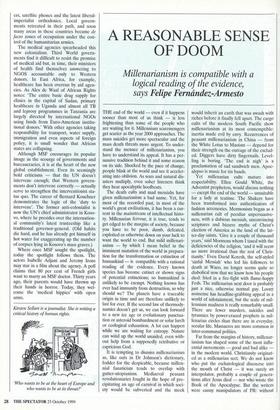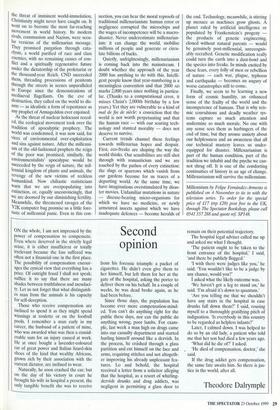A REASONABLE SENSE OF DOOM
Millenarianism is compatible with a logical reading of the evidence, says Felipe Fernandez-Annesto
THE end of the world — even if it happens sooner than most of us think — is less frightening than some of the people who are waiting for it. Millennium scaremongers get scarier as the year 2000 approaches. The mass suicides get more spectacular and the mass death threats more urgent. To under- stand the menace of millenarianism, you have to understand its appeal. It has a per- suasive tradition behind it and some reason on its side. Shocked by the pace of change, people blink at the world and see it acceler- ating into oblivion. As wars and natural dis- asters multiply, even sober listeners think they hear apocalyptic hoofbeats.
The death cults and mad messiahs have given millenarianism a bad name. Yet, for most of the recorded past, in most of the world's great civilisations, it has been a cur- rent in the mainstream of intellectual histo- ry. Millenarian fervour, it is true, tends to get edged to the margins of society, because you have to be poor, dumb, defeated, exploited or otherwise down on your luck to want the world to end. But mild millenari- anism — by which I mean belief in the imminent mutation of the world in prepara- tion for the transformation or extinction of humankind — is compatible with a rational reading of the evidence. Every known species has become extinct or shown signs of potential extinctions; so humankind is unlikely to be exempt. Nothing known has ever had immunity from destruction, so why should we? The planets have a traceable origin in time and are therefore unlikely to last for ever. If the second law of thermody- namics doesn't get us, we can look forward to a new ice age or evolutionary punctua- tion or asteroid bombardment or solar lurch or ecological exhaustion. A lot can happen while we are waiting for entropy. Nature can wind up the world unaided, even with- out help from a supposedly retributive or capricious God.
It is tempting to dismiss millenarianism as, like oats in Dr Johnson's dictionary, fodder for the despicable, because millen- nial fanaticism tends to overlap with gutter-utopianism. Mediaeval peasant revolutionaries fought in the hope of pre- cipitating an age of carnival in which soci- ety would be subverted and the meek would inherit an earth that was awash with riches before it finally fell apart. The cargo cults of the modern South Pacific show millenarianism at its most contemptible: inertia made evil by envy. Recurrences of peasant millenarianism in China — from the White Lotus to Maoism — depend for their strength on the outrage of the exclud- ed. Diggers have dirty fingernails. Level- ling is boring. 'The end is nigh' is a proclamation of sad sandwich men. Apoc- alypso is music for tin bands.
Yet millenarian cults mature into respectability. Ellen Gould White, the Adventist prophetess, would discuss nothing -- except the end of the world — unsuitable for a lady at teatime. The Shakers have been transformed into authenticators of fashion accessories. Mormonism began as a millenarian cult of peculiar unpersuasive- ness, with a dubious messiah, unconvincing scriptures and bizarre myths of Christ's election of America as the land of the lat- ter-day saints. 'Give it a couple of thousand years,' said Mormons whom I taxed with the deficiencies of the religion, 'and it will seem no more irrational than the rest of Chris- tianity.' Even David Koresh, the self-styled 'sinful Messiah' who led his followers to death at Waco, no longer seems quite so diabolical now that we know how his people died: fried in a fire-fight with flame-happy Feds. The millenarian next door is probably just a nice, otherwise normal guy. Loony nonsense has headline-grabbing appeal in a world of infotainment, but the scale of mil- lennium madness is really remarkably small. There are fewer murders, suicides and tyrannies by power-crazed prophets in mil- lenarian circles than there are in everyday, secular life. Massacres are more common in inter-communal politics.
Far from the margins of history, millenar- ianism has shaped some of the most influ- ential movements — good and bad alike in the modern world. Christianity originat- ed as a millenarian sect. We do not know who put the eschatological discourse into the mouth of Christ — it was surely an interpolator, probably a couple of genera- tions after Jesus died — nor who wrote the Book of the Apocalypse. But the writers were canny manipulators of PR: without the threat of imminent world-immolation, Christianity might never have caught on. It went on to become the most far-reaching movement in world history. Its modem rivals, communism and Nazism, were secu- lar versions of the millenarian message. They promised purgation through cata- clysm, a world purified of race and class enemies, with no remaining causes of con- flict and a spiritually regenerative future under the dictatorship of the proletariat or the thousand-year Reich. CND succeeded them, threading processions of penitents through the streets in scenes unparalleled In Europe since the demonstrations of mediaeval flagellants. On the eve of destruction, they called on the world to dis- arm — as idealistic a form of repentance as any prophet of Armageddon ever enjoined.
As the threat of nuclear holocaust reced- ed, the ecological movement took over the tradition of apocalyptic prophecy. The world was condemned, it was now said, for vices of environmental over-exploitation and sins against nature. After the millenni- um of the old-fashioned prophets the reign of the poor was promised; similarly, the environmentalists' apocalypse would be succeeded by the reign of nature, the mil- lennial kingdom of plants and animals, the revenge of the new victims of reckless humankind. Now chiliastic statisticians warn that we are overpopulating into extinction, or, equally unconvincingly, that we are doomed by our diminishing fertility. Meanwhile, the threatened ravages of the Y2K computer bug promise us a little fore- taste of millennial panic. Even in this con-
nection, you can hear the moral reproofs of traditional millenarianism: human error or negligence corrupted the microchips and the wages of incompetence will be a macro- disaster. Never underestimate millenarian- ism: it can change the world, mobilise millions of people and generate or circu- late billions of bucks.
Quietly, unfrighteningly, millenarianism is coming back into the mainstream. I doubt whether the approach of the year 2000 has anything to do with this. Intelli- gent people know that year-numbering is a meaningless convention and that 2000 AD marks 2,000 years since nothing in particu- lar. (Thanks to a computational error, it misses Christ's 2,000th birthday by a few years.) Yet they are vulnerable to a kind of mal de fin de siecle: a conviction that the world is not worth perpetuating and that the human race — with our soaring tech- nology and stunted morality — does not deserve to survive.
Current trends channel these feelings towards millenarian hopes and despair. First, eco-freaks are shaping the way the world thinks. Our sensibilities are still shot through with romanticism and we are touched by the pathos of every extinction: the slugs or sparrows which vanish from our gardens become for us traces of a departing world. At the same time, we have imaginations overstimulated by disas- ter movies. Unfamiliar mutations in nature — disease-bearing micro-organisms for which we have no medicine, or newly armoured insects against which we have inadequate defences — become heralds of the end. Technology, meanwhile, is stirring up menace as machines grow ghosts. A planet ruled by artificial intelligence or populated by Frankenstein's progeny the products of genetic engineering, cloned without natural parents — would be genuinely post-millennial, unrecognis- ably recrafted. Genetic modification really could turn the earth into a dust-bowl and the species into freaks. In minds excited by these fears, every folly of men or rebellion of nature — each war, plague, typhoon and earthquake — becomes an augury of worse catastrophes still to come.
Finally, we seem to be learning a new form of cosmic humility, an enhanced sense of the frailty of the world and the incompetence of humans. That is why seis- mic convulsions and deadly weather sys- tems capture so much attention and undermine so much morale. No one with any sense sees them as harbingers of the end of time, but they arouse anxiety about our helplessness and an awareness that all our technical mastery leaves us under- equipped for disaster. Millenarianism is part of the human condition, part of the tradition we inhabit and the psyche we can- not shrug off. It is one of the comforting continuities of history in an age of change. Millenarianism will survive the millennium.
Millennium by Felipe Fenuindez-Armesto is published on 4 November to tie in with the television series. To order for the special price of £17 (rrp £20) post free in the UK through The Spectator Bookshop, please call 0541 557 288 and quote ref SP148.



















































































 Previous page
Previous page